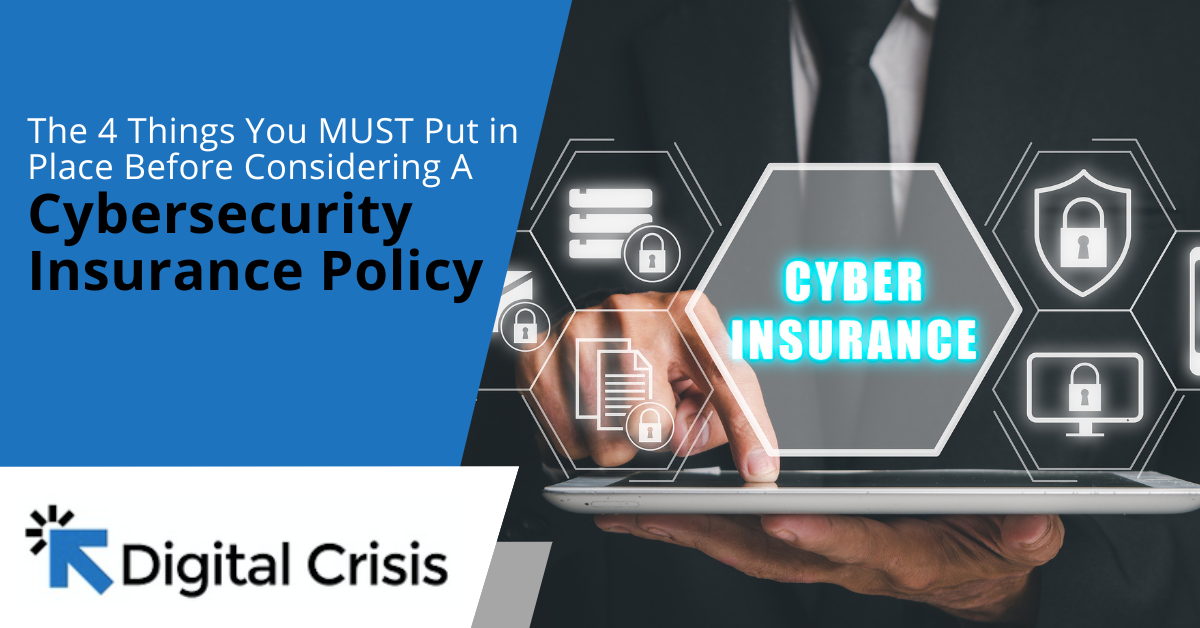
Cybersecurity is a pressing concern for businesses of all sizes and industries. Cyber-attacks have become increasingly sophisticated, and it's not just large corporations that are at risk.
Small businesses, including professional services firms such as law firms, accounting firms, CPAs, bookkeepers, investment firms, and property management companies, are also prime targets for cybercriminals.
Cybersecurity insurance policies are becoming more popular as businesses look for ways to mitigate the risks of a potential cyber-attack. However, before considering a cybersecurity insurance policy, there are four things that you MUST put in place to ensure that your business is adequately protected.
One of the easiest ways for hackers to gain access to your company's sensitive data is through weak or stolen passwords. That's why multi-factor authentication (MFA) has become a crucial part of any cybersecurity strategy.
MFA requires users to provide two or more forms of identification before gaining access to an account or system. This can include a password and a fingerprint, a password and a code sent to a mobile device, or any other combination of identification factors.
MFA significantly reduces the risk of unauthorized access to your company's systems and data. It's a relatively simple measure that can be implemented across your entire organization, including cloud-based services, email accounts, and financial systems. By requiring multiple forms of identification, MFA makes it much more difficult for hackers to gain access to your company's sensitive data.
A password manager is a tool designed to help users create and store strong, unique passwords for each of their accounts. Password managers allow users to generate complex passwords, and in some cases, they can also automatically input passwords into login fields.
Password managers can be accessed through a web browser extension or a standalone app, and they typically require the user to create a master password to access their stored passwords.
Using a password manager can significantly enhance the security of an organization's sensitive data. Weak passwords, password reuse, and password sharing are all common security pitfalls that can leave an organization vulnerable to attack. In contrast, a password manager can help users create and manage strong passwords that are difficult to guess or crack.
In addition to implementing a password manager, cybersecurity awareness training is also essential for organizations. Many cyber-attacks are successful because of human error, such as clicking on a phishing link or downloading a malicious attachment. By educating employees about the latest cybersecurity threats and how to avoid them, organizations can significantly reduce the risk of a successful attack.
Cybersecurity awareness training should cover a variety of topics, including phishing, malware, social engineering, and mobile device security. It should also be tailored to the specific needs and risks of the organization. For example, organizations that handle sensitive financial data may need to provide more specialized training on preventing financial fraud.
One effective way to deliver cybersecurity awareness training is through interactive exercises and simulations. These can include phishing simulations, where employees receive fake phishing emails and are trained to identify and report them. Organizations can also conduct tabletop exercises, which simulate cyber-attacks and allow employees to practice their response to an actual attack.
Cybersecurity awareness training should be an ongoing process rather than a one-time event. Cyber threats are constantly evolving, and employees need to be informed of new threats and best practices regularly. Regular training can also help reinforce the importance of cybersecurity and help create a culture of security within the organization.
Phishing attacks are one of the most common types of cyber-attacks. They involve sending a deceptive email that appears to be from a trusted source, such as a bank or a colleague.
The goal of a phishing attack is to trick the recipient into clicking on a link or downloading an attachment that contains malware or directs them to a fake website where they are prompted to enter sensitive information.
Phishing email tests are a way to assess your company's vulnerability to phishing attacks. They involve sending simulated phishing emails to your employees to see how many of them fall for the deception.
Phishing email tests can help you identify weaknesses in your organization's security posture and provide an opportunity to educate your employees about how to avoid falling victim to a real phishing attack.
Cybersecurity insurance policies can provide a valuable safety net for businesses in the event of a cyber-attack. However, they should not be viewed as a substitute for a robust cybersecurity strategy.
Before considering a cybersecurity insurance policy, make sure that you have the basics in place, including multi-factor authentication, password management, cybersecurity awareness training, and phishing email tests. By putting these measures in place, you can significantly reduce the risk of a successful cyber-attack and protect your business from the potentially devastating consequences of a data breach.
If you need help implementing these measures, please don't hesitate to contact Digital Crisis. We specialize in cybersecurity for professional services firms and can help you develop a comprehensive cybersecurity strategy that meets the unique needs of your business.